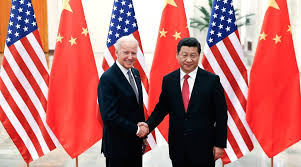Washington, Feb 12: US President Joe Biden in his maiden phone call with his Chinese counterpart Xi Jinping talked about the fundamental concerns he has with Beijing’s coercive and unfair economic practices, White House Press Secretary Jen Psaki said on Thursday, a day after the two-hour-long conversation between the two leaders.
Biden wants to lead with a clear and compelling affirmative US policy agenda and take steps to strengthen the US economy, she said.
“He wants to work with our partners and allies, as you’ve seen from the readouts we’ve done from the President’s engagement. He wants to take steps across government…,” Psaki told reporters at her daily news conference.
“He also is committed to being clear and candid in his engagements, as he was last night in…His lengthy conversation with President Xi, where he talked about the fundamental concerns he has, we have, about Beijing’s coercive and unfair economic practices. That obviously covers a range of concern, a range of issues: the crackdown in Hong Kong, human rights abuse across the country, increasingly assertive actions in the region, including toward Taiwan,” Psaki said.
President Biden, she said, is clear-eyed about the challenge that the US facing — that’s the strategic competition with China. “In order to get on our best footing in that competition, we need to take steps here at home, including making our own workforce more competitive, ensuring we are taking steps to protect our own technology, ensuring that…We are working with our partners and allies to do that,” she said.
“It is a reflection of our strategy, which is that we are going to get our house in order, in order to come into that competition from the strongest footing possible,” she said.
State Department Spokesperson Ned Price said the Biden Administration will engage with the Chinese when it is consistent with American interests and values.
“Even though we see this relationship through the lens of competition and our broad posture vis-a-vis China is to work to position ourselves to compete and to outcompete with the Chinese across any number of realms,” he said.
Responding to questions, Price said the United States is still in the initial stages of its engagement with the Chinese. “I would hasten to add that that initial engagement at the level of the Secretary of State and the President of the United States took place only after a number of calls with our closest allies and partners. There’s a reason why these engagements didn’t take place on day one,” he explained.
“We wanted to make sure that we had coordinated closely with our allies, including our allies in Europe and our treaty allies in the Indo-Pacific, but also our partners, including our partners throughout the Indo-Pacific, to make clear that our approach to Beijing was known to them, that we coordinated on that, and that, again, we positioned ourselves vis-a-vis China in the strongest possible position,” Price said when asked about the delay in talks with the Chinese president.
“When we talk about our strength in the context of the relationship with China, we derive strength from our values. We derive strength from our alliances, our partnerships. We also derive strength from what we do here at home,” he said.
At the Pentagon, China Task Force Director Ely Ratner told reporters that the Department of Defense has become increasingly focused on the China challenge.
“There’s been a proliferation of policies, activities and initiatives related to China, and the purpose of the task force was, particularly with the new team coming on board, a new Secretary, to ensure that those activities were synchronized, prioritized, and coordinated to the greatest extent possible,” he said.
A day after he was made in-charge of the China Task Force, Ratner said that the goal is not to boil the ocean. “What we’re going to do here is try to identify the most important challenges and opportunities for the (Defense) Secretary, try to identify what should serve as his and his team’s top priorities on China, whether those be issues that need secretary-level decisions or guidance, issues that need greater prioritization, attention, and resources, or issues that need either strength and/or new processes to move them forward to address them,” he said.
Republican Senator Rick Scott, in a statement, alleged that Biden is rolling back actions taken under President Trump to hold Communist China accountable and that such a move is reckless and show just how far he will go to appease the authoritarian regime.
“Failing to stand up to General Secretary Xi has absolutely devastating consequences for our national security and for that of our allies. We don’t need nice phone calls or another task force to study what’s going on with Communist China,” he said. (PTI)
Home International Biden talked with Xi about concerns over China’s coercive, unfair economic practices:...


